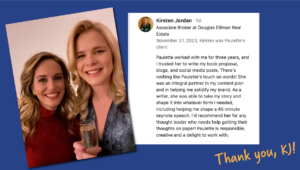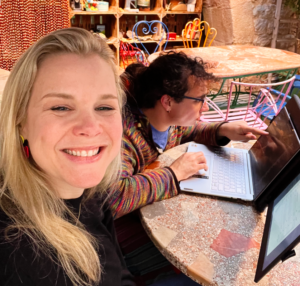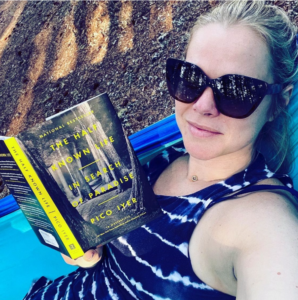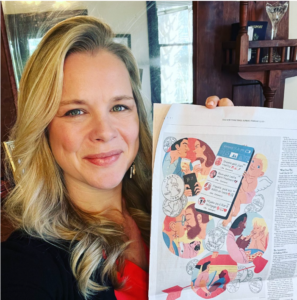I’m looking up Narratively’s instructions on how to pitch, and I see this from their editor, Lilly Dancyger:
“In case you’re wondering, here are some other done-to-death tropes that I never want to see again, with a few rare exceptions if you can really turn them upside down and make them new again:
–How a cancer diagnosis changed everything
–The story of your time in the Peace Corps
–Your “Eat, Pray, Love” story about finding yourself while traveling
–The dissolution of a marriage you were sure was going to last
–How a certain food always reminds you of home
That’s not to say that you can’t write about any of those topics (or that they’re not incredibly important and meaningful experiences), but know that they’ve each been written about approximately 17 million times, and you’ll need to work extra hard to make them feel fresh and surprising.”
The two that sent my face into a grimace were the death of a parent and Peace Corps. My dad was killed in a work accident when I was 17 and I’ve just accepted that I might never be done writing about it. I’ve told myself I’m only allowed to talk about Peace Corps unprompted for 10 years after my service, but I’m allowed to write about it indefinitely.
I pitched her an essay that started with my dad’s death and ended with Peace Corps. So, fingers crossed.
Then last week I went to teach at a retreat of Peace Corps Writers. Most of the volunteers lived abroad in the ‘60s, and oh my god, when the wine started flowing, the stories that came out. Nothing sounded like done-to-death tropes.
“I delivered a few babies on my kitchen floor.”
“They walked us down to the square, and they whipped him 21 times.”
“He said, ‘You take what you get from hand sex and you throw it at the woman?’ And I said, ‘Not exactly.'”
“Then they opened the door, and there was a whole gymnasium filled with people dying of AIDS.”
“He was from a town whose name meant the fart that never ends.”
“I ended up in a Leper colony when Kennedy got shot.”
“They said we had to do the surgery at night because there would be fewer bugs.”
Don’t you want to hear all these stories?
When I said I was going to write a memoir about Peace Corps, a writer I’d just met said, “Well, aren’t you concerned that will be a little cliché?” At first, it bruised my delicate-flower ego. But she did me a favor. She put me on high alert to rake my prose for clichés. Anyone writing about the biggies, like parenthood, first love, sex, divorce, and death, should be concerned that it will be a little cliché. Like any danger, you can’t protect yourself against it until you acknowledge it’s there.
So how do you, as Lilly says, turn traditionally cliché experiences upside down and make them new again?
Here are a 5 tips about successfully writing what could otherwise be cliché:
- Make a list of the clichés. Write down the things people would expect from a story about your topic. It could be the tone, the characters, the feelings, or the story arc. “I went to Peace Corps and became a good person!” Make a map of what you need to avoid.
- Make a list of all the ways your experience was the opposite of cliché. How will you flip the literary devices to create something new? One of my favorite stories during my Peace Corps writers retreat was one where this woman was totally jaded and skeptical from, like, the second she arrived. She was the opposite of the wide-eyed do-gooder.
- Go head-on into cliché. “This Is a Dead Mom Essay,” is the title of one story by Madeline Taterka. You can say out loud, “hey, I know this is a cliché topic. Here’s where this one is different…”
- Write a list of experiences only you had. A friend of mine had her LinkedIn profile copied. “Well,” I told her, “that means your profile sucked.” The differentiator is in the details. If I’m writing about Peace Corps, and I say the sun came over the hills and lit the grass, well, guess what, a thousand other people could say that, too. If I say my dad’s death ripped a hole in my heart, people might say yeah, no shit. But if I say my decision to say yes to every opportunity ended up with my dancing in a gold-sequined bra down my town’s streets, that’s new. If I say my family was broke until my dad finally got a steady job, and then that job killed him, that’s something that makes people listen. What’s something that happened during your cliché experience that was only true for you?
- Zoom way in. Start with one moment, one conversation, one day. Zoom way in, make the detail the story, and make the cliché experience a background that only comes in later. Talk about one specific and original scene that just so happened to occur during the wider cliché experience.
It’s quite possible to write about the experiences Lilly describes in a way that’s going to knock Lilly’s socks off. I’m sorry for all the editors who have to read these same stories over and over. Please, stop torturing them. Lilly’s tired. Give them the fresh.
Need examples? All the links on the topics above will send you to a story that tells the cliché in a new way.


































This Post Has 2 Comments
OMG that pic of you with the pig.
Love everything here, especially that.
XO
Hahaha. I know. Wild times.
Thanks for reading!
Comments are closed.